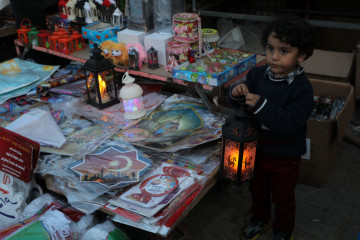

Eid al-Fitr, the three-day feast that signifies the end of the holy month of Ramadan is meant to be a happy, joyous occasion. But for the population of Gaza, deteriorating economic conditions, unemployment and wage stagnation have meant that celebrating this holiday in full is now a luxury.
In times gone by, Gazans would flock to the market to buy clothes, decorations and special sweets for their family. In particular, Fahmi Beek street used to be a favourite since it connected three of the largest markets in the besieged enclave: Al-Zawiya, Omar Al-Mukhtar and Al Shuja'iya.
This year, the streets and markets are eerily quiet.
"83% of the population of the Gaza Strip lives below the poverty line... the average daily income per capita is two US dollars"
Salem al-Sawalha, a young man hailing from Gaza City went with his three friends to buy Eid clothes, a traditional gift across the Muslim world, from Omar Al-Mukhtar street. After three hours of walking, Salem and his friends would return empty-handed.
"The prices are now very expensive. I cannot afford anything at such cost," the 25-year-old man told The New Arab, adding that "the price of one shirt is now up to $30, in previous years this same shirt wouldn't be more than $15."
This year, Salem's option is now to either mend his old clothes or buy second-hand clothes at reduced prices. "These days life is very difficult for everyone in Gaza, both for the vendors and the consumers. No one benefits from the situation", Salem said.
Kifah Hana, a mother of five, has altogether avoided going to the markets, choosing instead to buy from vendors on the road which are usually cheaper. This, to her, seemed like the only option to ensure they celebrated Eid as they usually do.
The 42-year-old told The New Arab that "children do not understand the meaning of not having money, they don't understand poverty. They think we can buy anything at any time. As a result, I just have to buy the basics, on a meagre budget so that they can be happy like other children."
Goods are now piled high on the shop shelves. Shop owners complain that purchasing power has decreased by 40% this year when compared with previous years.
Israel has imposed a tight siege on the Gaza Strip since mid-2007 after the Islamic Hamas movement took control of the enclave after rounds of fighting with forces loyal to the Palestinian Authority.
Since then, all regional and international efforts and mediations to achieve reconciliation have faltered. This situation casts a dark shadow on the economic and living reality in Gaza.
According to a report issued by the Palestinian Central Bureau of Statistics for International Labour Day in 2021, the unemployment rate in the Gaza Strip has reached 50 percent.
The report indicated that about 83 per cent of the population of the Gaza Strip lives below the poverty line, as a result of the deteriorating political and economic conditions, in addition to the strict Israeli blockade on the Strip. According to the People's Committee to Confront the Siege on Gaza, the average daily income per capita is two U.S. dollars.
Mohammed al-Shurafa, a clothing merchant from Gaza complained about the effect of this economic stagnation to The New Arab, saying that "the situation is very tragic, even when Hamas and the Palestinian Authority pay salaries, this has no effect on the market. People do not have enough money to buy Eid clothes or decorations for their homes. We will experience huge losses this Eid."
Despite this, many Gazan women have started preparing Eid al-Fitr celebrations in their own way, with many busy making traditional date-filled cookies in their houses.
Hiba al-Astal and three of her sisters, all mothers with children, gathered in her house to make Eid cakes. "I cannot deprive my children of all aspects of celebrating the feast (...) Making cake is a traditional custom associated with holidays, so I make sure to observe this despite the economic situation,” the 39-year-old mother of four told The New Arab.
"I feel happy when I see my children gather around me while I prepare cakes for them," she said. Despite growing hardship, sometimes it is the little things that cause the brightest smiles.
Sally Ibrahim is The New Arab's correspondent from Gaza






 Follow the Middle East's top stories in English at The New Arab on Google News
Follow the Middle East's top stories in English at The New Arab on Google News


